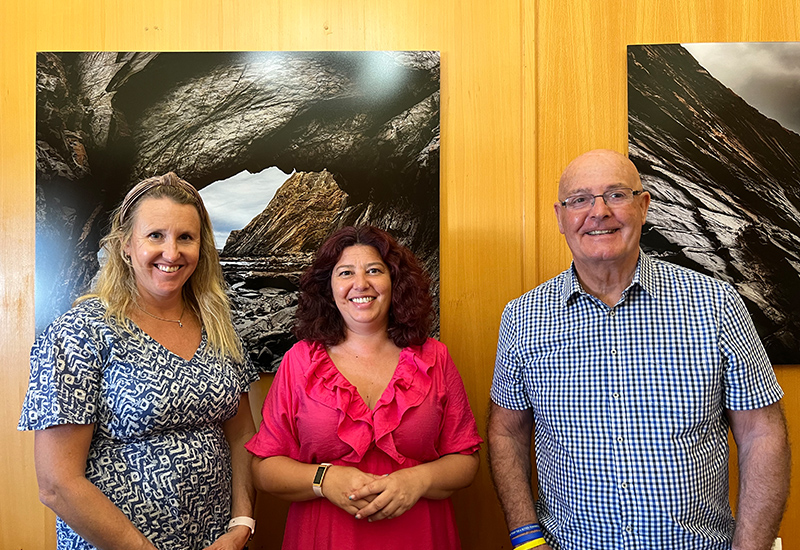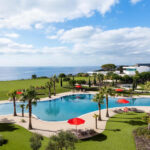Rute Silva made history as the first female president of the Vila do Bispo câmara. Sophie Sadler went to meet her to learn more about her and the municipality.
Rute Silva greets me warmly as I enter her office on the first floor of the câmara building in the centre of Vila do Bispo. She is friendly and approachable, but I immediately get the impression that she is a lady with a mission!
Sra Silva became president of the Vila do Bispo Municipal Council in May 2021. Previously, she was elected as Vice Mayor and Councillor of Vila do Bispo Town Council in the 2009, 2013 and 2017 local elections. She took up the position of president following the somewhat controversial resignation of her predecessor, Adelino Soares, who left to assume the duties of an executive member of the company Algar.
The new president had served for only a few months when she came up for re-election in September 2021. She secured victory for the socialist party with a narrow margin of 33 votes. The voting public likely penalised her for her predecessor’s failings. In an excerpt from her Declaration of Taking Office, made on 27 May 2021, she said, “….. I cannot fail to express my surprise and profound disappointment at the unreasonable manner in which his (Adelino Soares) departure took place, without any prior communication, nor any handover of responsibility (I mean documentation!) to his vice-president and councillors, a situation which I note as being of the utmost gravity.” When I asked her to expand on this, she chose not to comment further.
I ask what it means to be the first woman president of the Vila do Bispo Council and how this will be reflected in her mandate. “I am personally proud to be a woman and a citizen. In practice, I don’t think that the fact that I’m a woman conditions my political and municipal performance. Quite the contrary! I am sure that I am contributing, in a decisive way, to an effective change of paradigm in the way of being and doing politics in Vila do Bispo. In a mostly and traditionally male world, women can make a difference with their feminine distinction.”

President Rute Silva photo courtesy of www.facebook.com/municipioviladobispo
Rute’s mother was born in Sagres and her father was from Castelo Branco District. They started their family in Sagres and she was born in Portimão on the 7th of October, 1975. She grew up in Sagres, but attended her 2nd Cycle of schooling in a college in Vila Nova de Milfontes. She then attended a school in Portimão but finished her 12th grade in Lagos. She took her licentiate degree in Lisbon, graduating in Psychology in the area of Clinical Psychology and Counselling.
During her academic training, she worked as a technician at CASLAS – (Centro de Assistência Social Lucinda Anino dos Santos) in Lagos. This social solidarity institution is dedicated to the inclusion and social promotion of youngsters, disabled people, the elderly and the vulnerable who suffer from hardships, abuse or social exclusion. She was appointed as a technical staff member of CPCJ – Children and Youth Protection Commission of Lagos and worked as a trainer in Child Development and in the Professional Rehabilitation Unit of Lagos. She was also President of Vila do Bispo Red Cross and President of Vila do Bispo CPCJ. In 2004, she started working as a psychologist in the Municipal Council of Vila do Bispo.
After her election to the council in 2009, she was given responsibility for several departments, including Education, Health, Housing, Social Action, Employment, Culture, Natural and Cultural Heritage, Research, Environment, Tourism, Sports and Youth and Associations. This can all be viewed as admirable training for her role as Mayor of Vila do Bispo. One of her key objectives is now to make all municipal buildings accessible to people with reduced mobility.
She believes that politics is an extension of citizenship. “Generally, elected representatives are vested with civic responsibility, as the highest representatives of their communities. Mayors, in particular, are vested with exceptional power: the power to fulfil the aspirations of their fellow citizens, the power to make things happen!”
She defines the socialist party as being a fit for her strong ideals “precisely because I identify with its current constituent values and principles, namely: freedom, equality, solidarity, diversity, initiative, innovation and progress. These are the coordinates with which I try to conduct my political mission through a strategic plan based on six essential pillars: People, housing, quality of life, competitiveness, environment and sustainability.” She is an advocate for democratic, and above all, responsible governance, always in the uncompromising defence of the interests of the municipality and its citizens.
Upon taking office, the president promised to “take on an increased responsibility in representing the women of our land and in defending the values of Equality, Parity and Humanity.” She has her work cut out for her in Vila do Bispo, which is a small, extreme, peripheral and apparently low population density borough. The 2021 census recorded 5717 residents, spread across 2555 households and 6006 dwellings, a mostly adult and ageing population spread across four parishes, two towns and nine villages.
A lack of housing for the local population is a key issue that needs to be addressed. Sra Silva’s council has already concluded the Local Housing Strategy of the Vila do Bispo Council, a document approved by the Municipal Assembly and submitted to the IHRU – Institute of Housing and Urban Rehabilitation. It is an essential element in obtaining financing for the construction of new homes and the renovation of existing housing. Meanwhile, she tells me, “we are already carrying out improvement works in some municipal buildings, giving them new life, comfort and energy efficiency. We are also ready to move ahead with a new development in Barão de São Miguel, aimed at families who want to build their own homes. We provide land at controlled prices in order to help families build their homes. We want young people not to feel obliged to leave our municipality to find a home; we want them to stay and build their families here. We also want to fulfil the dream of many people who want to settle in this land of ours.”

Vila do Bispo Municipality present at the Faro airport name ceremony in September Courtesy of www.facebook.com/municipioviladobispo
As part of this ambitious plan, the council is aiming to create more housing in Senhora do Amparo in Vila do Bispo before the end of 2025. The first buildings to be built will be destined for Social Housing. Rute comments, “It is undeniable that prices, both for land and property, are highly inflated, especially in the Algarve, so measures must be taken urgently. The construction of accessible houses, the reinforcement of supported rents and the acquisition of new land for housing, are all essential. I aim to reduce the difficulties in accessing a stable home, promoting the settlement of the population by fulfilling their right to housing, with special attention to young people and entrepreneurs.”
Sra Silva is also looking to implement a quick response to the need for a new School Centre in Vila do Bispo: Her aim is to create more pre-school places along with 1st, 2nd and 3rd Cycles of Schooling, with a new municipal sports and multipurpose pavilion.
She believes the population of Vila do Bispo to be much higher than the census, which poses another challenge. The growing settlement of non-registered expats, the seasonal population of second-home owners and the floating population that results from tourism flows has been increasing significantly year after year, especially from March to October. This causes a strain on local services. Issues with water are a huge concern in this region, so Rute is aiming to conclude the municipal water efficiency project, improve and upgrade the public water supply network and create sustainable strategies for responsible consumption and reuse of water. She is also looking to improve the quality of urban waste collection services and eco points, which overflow in the summer months. Promoting new recycling, composting and Circular Economy strategies and investment in energy efficiency are all high priorities.
She is also looking to improve some of the roads in the municipality which have seen a huge increase in traffic. Work is being done on the Estrada Nacional 268 in its urban section of Sagres, and work on the Municipal Road 268 (Vila do Bispo – Aljezur) has been concluded.
Although she recognises that “tourism is the great engine of the local economy,” she points out that it causes a big problem because Central State financing for Local Authorities is calculated by the number of registered inhabitants in relation to the area of the territory. Given the number of visitors to her municipality, she thinks this equation is unfair. “In 2022, the State Budget transferred to Vila do Bispo Council €2,929,116, an amount that is practically exhausted in the expense of the salaries of the Council’s employees, therefore clearly insufficient for the growing needs of territory management.”
Despite “traditional” industries, such as fishing, seafood, agriculture and herding being on the decline, according to data from IEFP – Instituto de Emprego e Formação Profissional (Institute for Employment and Professional Training), in recent years, the municipality of Vila do Bispo has registered some of the lowest unemployment rates in Portugal. However, levels of qualifications are low, and the supply of jobs is greater than the demand, especially in the areas of catering, hotels and even in the municipality itself. Part of the problem is related to the lack of available housing. In this context, she argues “it is becoming increasingly urgent to create conditions for young people and families to remain in the area, also increasing its attractiveness and reception conditions for those who dream of settling here, improving the quality of life of the community as a whole, integrating and benefiting from its plurality, diversity, multiculturalism and entrepreneurship.”
Without a majority in the câmara, is the president finding it difficult to implement policies or are all political parties working together for the greater good? “I confess that it would be much easier to develop my political and social project with the collaboration of one or two more councillors from the list I proposed in the last elections, simply because we would have a larger team with a greater diversity of skills. Even so, I think my personality fits the conditions dictated by the electorate. Because I believe in the values of democracy and I am a woman of dialogue. I seek consensus and understanding in favour of this land and its people. My mandate has therefore proceeded in a normal democratic manner and without major problems.”
With 95% of the Vila do Bispo territory in protected areas, mainly the Southwest Alentejo and Vicentine Coast Natural Park, the mayor has been quoted as saying, “the future of Vila do Bispo is what nature gives us. We just have to use it in a sensible and sustainable way.”
Rute believes that the borough of Vila do Bispo appeals to visitors who want the enjoyment of Nature and Cultural Tourism products. “The very tourist who seeks out our territory is different from the typical “Algarvian tourist.” In Vila do Bispo, there are more travellers than tourists, people who tend to be more sensitive, informed, demanding and appreciative of the genuine values of the destinations they visit. If, on the one hand, tourism inevitably implies a destructive impact on our natural heritage, on the other hand, tourism can be utilised as a guarantor of the heritage itself. Since this is not a natural symbiotic relationship, heritage and tourism may coexist in harmonious mutual valorisation. The formula for balance should reside in sustainability.”
This mantra is clearly born out in the annual Sagres Birdwatching Festival, the organisation of which she has been involved with since its inception. Every year she wants this event to contribute towards infrastructure that can support birdwatchingor nature tourism. “We are working towards this with projects that can be applied for co-financing under the European Investment Funds and the Recovery and Resilience Plan. This will enhance the regular and repeated visit of birdwatchers, ornithologists, researchers, local community and school community, in a sustainable way and in a perspective of environmental awareness.”


Celeiro da História future Vila do Bispo museum 3Ds
Courtesy of www.spaceworkers.pt
Another one of her key initiatives is to open to the public the Municipal Museum of Vila do Bispo ‘O Celeiro da História’ – The Barn of History, which will showcase the borough’s “unique” local history and attract more out-of-season visitors.
With all of these ambitious goals, what would the president say is her greatest success so far? “Having been worthy of the trust placed in me. I will do everything I can to return that trust to the community with a sense of commitment, total dedication and hard work, always with the responsible mission of achieving more and better for the territory, its people and those who visit us. It is, therefore, an answer that will be given by time and by the community.”
Like everyone I have met from this stunning westerly pinnacle of Europe, Rute has a deep-rooted appreciation of the land and its beauty. She would like to be remembered “as someone who deserved the land where she was born and grew up and contributed to the sustainability of its resources and of its inestimable Natural and Cultural Heritage… towards a better and lasting future.”
With such worthy ambitions, I believe the future looks bright and sustainable with Rute Silva as president.
Did you know:
Situated in the extreme southwest corner of Portugal (and also continental Europe), the municipality of Vila do Bispo is located within the Barlavento Algarvio, the southwestern Algarve coast. Part of the Faro District, the municipality is bordered in the north by Aljezur and to the east by Lagos. Due to its geographical location, it is the only municipality in the country with a western and southern coastline.
Vila do Bispo has only been a municipality for a recent period. Separated from the municipality of Lagos, since the reign of King Afonso VI (around 1640), when it included the parishes of Barão de S. Miguel, Bordeira, Budens, Carrapateira, Raposeira, Vila do Bispo and Sagres (which was later carved from the municipality in 1519 and functioned as its own municipality until 1834).
Dissolved in 1855, the region was reintegrated into Lagos. But, six years later, as a consequence of Liberal reforms, it was reincorporated in September 1861, with many of the same parishes, except Bordeira and Carrapateira (which were abolished in 1849, and integrated into the municipality of Aljezur in 1849). The municipality was, once again, abolished in August 1895 and re-established in January 1898.
Source Wikipedia













